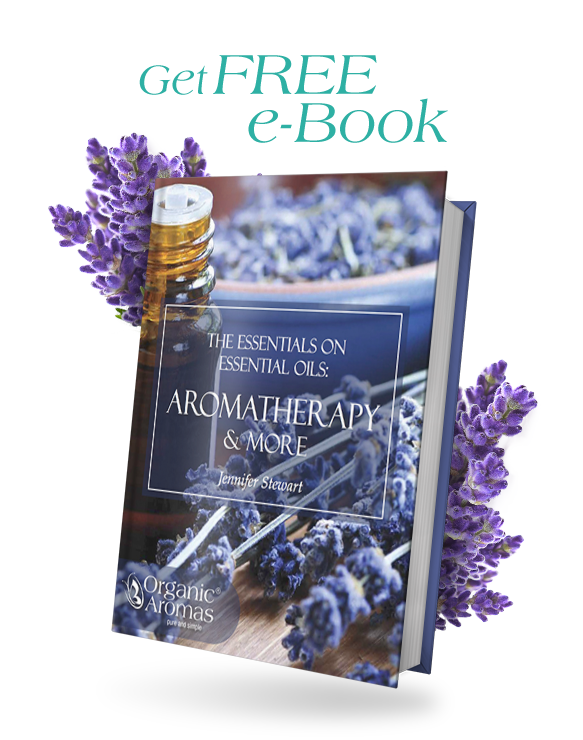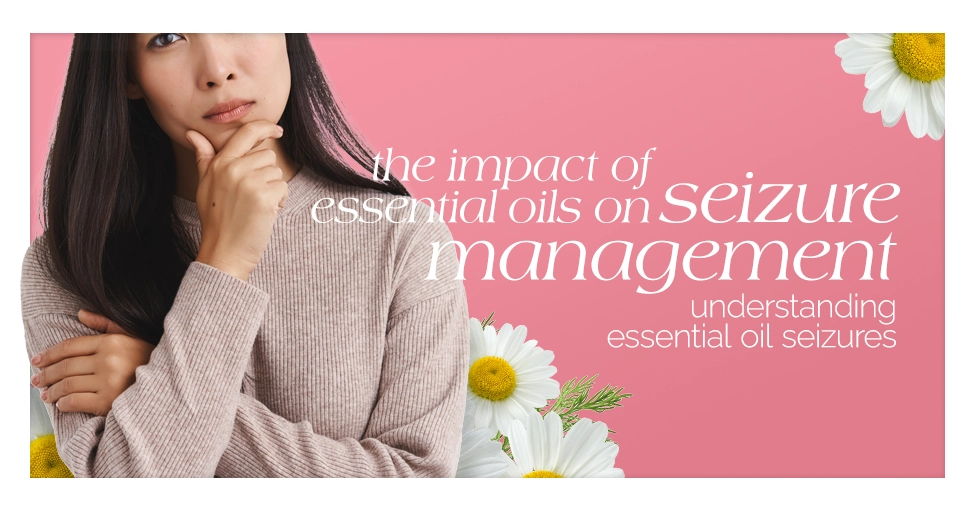The Impact of Essential Oils on Seizure Management: Understanding Essential Oil Seizures
For those impacted by epilepsy, the question of whether essential oils can prevent or provoke seizures is often top of mind. The term ‘essential oil seizures’ encompasses this critical debate. We’ll tackle this pressing issue head-on, offering insights into essential oils that may offer therapeutic benefits for seizure management, as well as outlining those known to trigger seizures. Through a careful examination of scientific literature and anecdotal evidence, our article provides a roadmap for using essential oils safely in the context of epilepsy.
Understanding Essential Oil Seizures and Epilepsy:
- Essential oils may serve as a complementary method for managing seizures by potentially reducing stress, a known trigger for epilepsy, and some may have anticonvulsant properties, but they are not a replacement for conventional treatment.
- Certain essential oils, such as sage, hyssop, rosemary, camphor, pennyroyal, eucalyptus, cedar, and thuja, should be avoided by those with epilepsy as they can contain pro-convulsant properties like camphor and 1,8-cineole that may provoke seizures.
- Guidance and consultation with healthcare professionals are crucial for individuals with epilepsy when using essential oils to ensure safety, effectiveness, and compatibility with seizure medications, as well as proper dilution and application methods.
Understanding Seizures and Epilepsy

Epilepsy, much like an unwelcome intruder, disrupts the normal electrical activity in our brains, leading to recurrent epileptic seizures. The unpredictability of these seizures can make epilepsy an incredibly challenging condition to live with, impacting both the physical and mental well-being of those affected. But what triggers these electrical misfires? Seizures can be triggered by a myriad of factors such as:
- alcohol consumption
- lack of sleep
- stress
- dehydration
- illness
- skipped meals
But it’s not just these external factors that can tilt the balance.
Causes of Epilepsy
Epilepsy is often a jigsaw puzzle, with pieces comprising genetic factors, head trauma, and brain conditions, among others. These pieces come together to form the complex picture of epilepsy, giving us a deeper understanding of its intricacies. However, the puzzle isn’t always complete, as in about half of the cases, the cause of epilepsy remains unknown. This mystery underscores the complexity of epilepsy and the need for continued research.
Even though the cause can be hard to pinpoint, epilepsy’s manifestations, evident in different seizure types, are easier to identify.
Types of Seizures
Seizures, including epilepsy and acute seizure, can be broadly categorized into generalized onset seizures, which affect both sides of the brain, and focal onset seizures, which begin in one area of the brain. Generalized tonic clonic seizures are a type of generalized onset seizures. Imagine a storm; a generalized onset seizure is like a storm that engulfs the entire city, while a focal onset seizure is akin to a storm that targets a specific neighborhood. The signs of these seizures can vary from rhythmic jerking to changes in emotions and thinking, making them an experience as complex as their triggers.
With triggers in mind, it’s beneficial to explore common factors that might provoke a seizure.
Common Triggers
Uncovering the triggers of seizures can be like a detective’s job, requiring meticulous observation and pattern recognition. Common culprits include:
- Missed medication doses
- Exposure to bright lights
- Lack of sleep
- Stress
- Infections
- Hormonal changes
- Dehydration
- Low blood sugar levels
- Alcohol or drug use
- Certain medications
By identifying and understanding these triggers, individuals with epilepsy can take proactive steps to manage their condition.
But could there be another layer to managing epilepsy, perhaps one involving the scents of nature?

Sign Up to Get Your FREE
e-Book Here…
Essential Oils and Seizure Management: Anticonvulsant and Pro-convulsant Properties
Essential oils are gaining attention for their potential roles in seizure management. Understanding which oils may help reduce seizure frequency and which could potentially trigger seizures is crucial for individuals with epilepsy.
Anticonvulsant Properties of Essential Oils
Mechanisms and Evidence:
- GABAergic System Modulation: Essential oils like lavender enhance the inhibitory effects of gamma-aminobutyric acid (GABA), a key neurotransmitter that helps stabilize nerve activity and prevent seizures. By modulating the GABAergic system, these oils contribute to a calming effect and may reduce seizure susceptibility2.
| Essential Oils with Protective Anticonvulsant Properties | Potential Benefits | Essential Oils That May Provoke Seizures | Known Risks |
|---|---|---|---|
| Frankincense | May reduce seizure frequency and intensity due to anti-inflammatory and antioxidative properties. | Sage | Contains thujone, which can be pro-convulsant. |
| Lavender | Known for calming effects that might reduce stress-induced seizures. | Hyssop | Contains pinocamphone, known to be convulsant. |
| Chamomile (Roman) | Potentially calming and might help with stress-related triggers. | Rosemary | Contains camphor and 1,8-cineole, which can provoke seizures. |
| Norwegian Angelica | Impacts neurotransmission potentially altering seizure activity. | Camphor | Contains high levels of camphor, a strong convulsant. |
| Bitter Orange | Contains components that might act on the GABAergic system, reducing excitability. | Pennyroyal (Mentha pulegium) | Contains pulegone, which can induce seizures. |
| Caraway | Known to have antispasmodic properties that could be beneficial. | Eucalyptus | High in 1,8-cineole, linked to seizure activity. |
| Verbena (Vervain) | May modulate neuronal activity and prevent excessive electrical discharges. | Cedar | Contains compounds that might be neurotoxic at high concentrations. |
| Acorus (Calamus) | Thought to impact neurotransmission in ways that could inhibit seizures. | Thuja | Contains thujone, similar to sage, posing seizure risks. |
The Role of Essential Oils in Seizure Management

Exploring the realm of essential oils, we should clarify that they serve as a complementary approach to wellbeing, not a replacement for conventional treatment. Essential oils may offer a unique perspective on seizure management by potentially reducing stress, a known trigger for seizures. The soothing scents of essential oils can create a sanctuary, a safe haven where the brain can rest and recuperate. It’s crucial to mention that essential oils should be combined with a carrier oil before use (or if using inhalation exposure should be limited) to ensure safe application, especially for individuals with epilepsy, as they are often overused due to misconceptions about their natural and plant-based origins.
Interestingly, some individuals with epilepsy have turned to aromatherapy massage as a technique to condition their response to stress, potentially preventing seizures when in a relaxed state. This brings us to discuss the potential benefits of aromatherapy in managing seizures.
Benefits of Aromatherapy
Aromatherapy can paint a sensory landscape, where the calming fragrance of essential oils can create an atmosphere of tranquility. Frankincense oil, for instance, is thought to have properties that could help in reducing the frequency and intensity of seizures. But it’s not just the ambiance that essential oils create.
Some essential oils may have anticonvulsant properties, potentially impacting seizure activity.
Anticonvulsant Properties of Essential Oils

Essential oils that may possess anticonvulsant properties include:
- (Norwegian) angelica
- Bitter orange
- Verbena
- (Calamus) Acorus
- Caraway
These oils can impact neurotransmission in the brain through the GABAergic system, potentially altering seizure activity. Additionally, frankincense oil has antioxidative and anti-inflammatory qualities that might contribute to its beneficial effects on seizure management.
The potential benefits of essential oils extend beyond reducing seizures; they can also significantly contribute to stress reduction and relaxation.
Stress Reduction and Relaxation
Stress is like the proverbial match that can light the fuse of a seizure. This is where essential oils like lavender and chamomile, known for their calming and soothing properties, can come into play, helping to reduce stress and promote overall wellbeing.
Techniques such as meditation and deep breathing can impact electrical activity in the brain and central nervous system, helping to reduce seizures in some individuals. But while essential oils can be beneficial, it’s important to recognize that not all oils are suitable for individuals with epilepsy.
Essential Oils to Avoid for Those with Epilepsy
Essential oils are like a double-edged sword. While some oils may help manage seizures, others can potentially trigger them. Oils to avoid if you have epilepsy include:
- Sage
- Hyssop
- Rosemary
- Camphor
- Pennyroyal (Mentha pulegium)
- Eucalyptus
- Cedar
- Thuja
Certain oils in this list contain compounds associated with pro-convulsant properties, a subject we’ll cover in the following section.
Pro-convulsant Essential Oils
Certain essential oils can exert a stimulating effect on the body and brain that could lead to seizures. These oils contain components like:
- camphor
- 1,8-cineole
- thujone
- pinocamphone
These components are known to have the potential to induce seizures. Considering this, neurologists and physicians should always consider exposure to pro-convulsant essential oils when evaluating patients experiencing seizures.
Within these pro-convulsant substances, camphor and 1,8-cineole warrant a detailed examination.

Sign Up to Get Your FREE Pets
e-Book Here…
Camphor and 1,8-cineole
Just as a single spark can start a wildfire, small quantities of certain components in essential oils, such as eucalyptus oil, can trigger seizures. Camphor and 1,8-cineole, found in eucalyptus oils from eucalyptus and camphor trees, can provoke seizures. Ingesting even small quantities of oils high in these compounds can lead to tonic-clonic seizures, especially in children.
Alongside essential oils, herbal remedies are also known to have an impact on seizure management as a form of alternative medicine.
Herbal Remedies and Potential Risks
Herbal medicine, which uses extracts from plants to restore natural balance, can also play a role in epilepsy management. However, just like essential oils, certain herbs like schizandra, kava kava, and comfrey may increase seizure frequency. St John’s Wort, a commonly used herb for depression, can interfere with the efficacy of anti-seizure medications.
Hence, epileptic patients should thoroughly research the ingredients and have a discussion with their doctor to ensure safe integration with their seizure management plan.

Sign Up to Get Your FREE Essential Oils e-Book Here
Safe Use of Essential Oils for Individuals with Epilepsy
Navigating the world of essential oils for epilepsy management requires care and guidance. Consulting with healthcare professionals is crucial before trying aromatherapy for epilepsy to avoid negative interactions with seizure medications. This collaboration ensures that the use of essential oils is tailored to each individual’s needs and circumstances.
We should further explore the significance of professional consultation.
Consulting with Professionals
When it comes to using essential oils for epilepsy, a qualified therapist must be fully aware of an individual’s:
- type of epilepsy
- seizure patterns
- coexisting conditions
- concurrent medications
Professional counselors found through authoritative bodies like the Complementary and Natural Healthcare Council ensure high standard of care in complementary therapies for epilepsy. However, due to limited regulation of complementary therapists, individuals must check for qualifications and affiliations with professional bodies.
Proper Dilution and Application Methods
Essential oils are like potent potions. They must be diluted in a ‘base’ oil before use in massage or inhalation should be regulated to prevent adverse reactions. Nebulizing diffusers® are often utilized in home aromatherapy to disperse essential oils, which can be absorbed into the bloodstream and potentially impact seizure triggers. However, seizures can be triggered by topical application, inhalation, or even the ingestion of certain essential oils.
Therefore, it is vital to continuously monitor and adjust treatment plans that incorporate various essential oils, including many essential oils and the following essential oils.
Monitoring and Adjusting Treatment
Just like a ship’s captain adjusting course based on the changing winds, individuals with epilepsy must continuously engage with a healthcare provider to assess the effects of essential oils and make necessary adjustments to the treatment plan. This ongoing dialogue ensures that the use of essential oils remains effective and safe.
Promising Essential Oils for Seizure Management

In the vast landscape of essential oils, certain oils stand out for their potential benefits in seizure management. These oils, such as lavender, chamomile, and frankincense, may help reduce seizures caused by stress. They can soothe the nervous system and help it balance itself out, which could be beneficial for seizure management.
Let’s examine these promising oils in detail.
Lavender Oil
Lavender oil, with its soothing scent, is renowned for its calming effects. These calming effects are thought to contribute to reducing the frequency and severity of seizures. Unlike stimulating oils like bergamot, lavender oil has a relaxing effect that can be beneficial in managing seizures.
Yet, lavender isn’t the sole beneficial oil. Lavender essential oil and chamomile oil also hold potential.
Chamomile Oil
Known for its calming effects on the nervous system, chamomile oil could potentially aid in the control of seizures. Its sedative properties make it a subject of interest for potentially aiding in the control of seizures. However, further clinical research is necessary to validate its effectiveness in seizure management.
Frankincense Oil
Popular for epilepsy management, frankincense oil supports seizure management by affecting the limbic system of the brain, which is involved in regulation of emotions and memory. Its influence on the limbic system can potentially aid in emotional release and memory functions, possibly contributing to a reduction in seizure severity.
Despite the promise these oils show, it’s essential to keep in mind that research on their effectiveness continues.

Current Research and Future Directions
The world of essential oils and epilepsy is a burgeoning field of research. The approval of Epidiolex, a CBD oil, by the FDA for treating certain types of childhood epilepsy underlines the recognition of the therapeutic potential of certain essential oil components. A UK study has also indicated that aromatherapy massages with specific essential oils may have a preventive effect on seizures. However, more scientific validation is needed to confirm the effectiveness of oils like lavender in seizure management.
Real-Life Experiences: Testimonials and Case Studies
Nothing paints a more vivid picture of the potential benefits of essential oils for seizure management than the stories of those who’ve experienced their effects firsthand. One mother, for instance, shared her journey of managing her daughter’s frequent seizures. After conventional approaches had failed, she turned to essential oils as an alternative treatment.
The daughter experienced positive results using essential oils for three months and maintained improved health for over six months without any side effects. These personal stories, while anecdotal, provide valuable insights into the potential role of essential oils in seizure management and underscore the need for further documentation and research into individual experiences.
Final Thoughts on Essential Oils on Seizure Management
Navigating the complex world of epilepsy, we’ve explored the potential role of essential oils in seizure management. While some essential oils show promise in reducing stress and potentially mitigating seizures, others may trigger them. The key lies in understanding the individual’s unique needs, consulting with healthcare professionals, and carefully selecting and applying essential oils. As promising as essential oils may be, it’s important to remember that they are not a replacement for conventional treatment but rather a complementary approach. As research continues to unfold, we look forward to a future where the therapeutic potential of essential oils is fully unlocked for individuals with epilepsy.

Join Our Exclusive Member Club to get Big Discounts!
Frequently Asked Questions
Can essential oils cure epilepsy?
No, essential oils cannot cure epilepsy, but they can be used as a complementary approach to possibly manage seizures, along with conventional treatment.
Are there any essential oils that should be avoided by individuals with epilepsy?
Individuals with epilepsy should avoid essential oils such as sage, hyssop, rosemary, camphor, eucalyptus, and thuja, as they have the potential to trigger seizures.
What are the potential benefits of using essential oils for epilepsy management?
Using certain essential oils can potentially help manage seizures by reducing stress, a known trigger for seizures, and they may also have anticonvulsant properties.
How should essential oils be used safely by individuals with epilepsy?
To use essential oils safely, individuals with epilepsy should dilute them in a base oil or, if using inhalation, temper their exposure to the oils and consult healthcare professionals to avoid negative interactions with seizure medications. Continuous monitoring and adjustment of treatment plans involving essential oils is necessary.
Can essential oils replace anti-seizure medications?
No, essential oils should not replace anti-seizure medications. They are meant to complement conventional treatment, not replace it.
- López, V., Nielsen, B., Solas, M., Ramírez, M., & Jäger, A., 2017. Exploring Pharmacological Mechanisms of Lavender (Lavandula angustifolia) Essential Oil on Central Nervous System Targets. Frontiers in Pharmacology, 8.[/efn_mote] .
- Incensole Acetate in Frankincense: Found in frankincense oil, incensole acetate interacts with transient receptor potential vanilloid (TRPV3) channels, which play a role in neurotransmitter release and neuroinflammation. This interaction may provide anticonvulsant and neuroprotective benefits, making frankincense a promising candidate for complementary epilepsy therapy.
- Camphor and 1,8-Cineole: Present in oils like eucalyptus and rosemary, these compounds increase neuronal excitability, potentially lowering the seizure threshold and triggering seizures in susceptible individuals.
- Thujone: Found in oils such as sage, thuja, and wormwood, thujone acts as a GABA antagonist, reducing inhibitory neurotransmission and increasing the risk of seizures1Bahr, T., Rodriguez, D., Beaumont, C., & Allred, K., 2019. The Effects of Various Essential Oils on Epilepsy and Acute Seizure: A Systematic Review. Evidence-based Complementary and Alternative Medicine : eCAM,
Pro-convulsant Properties of Essential Oils
Compounds of Concern:







